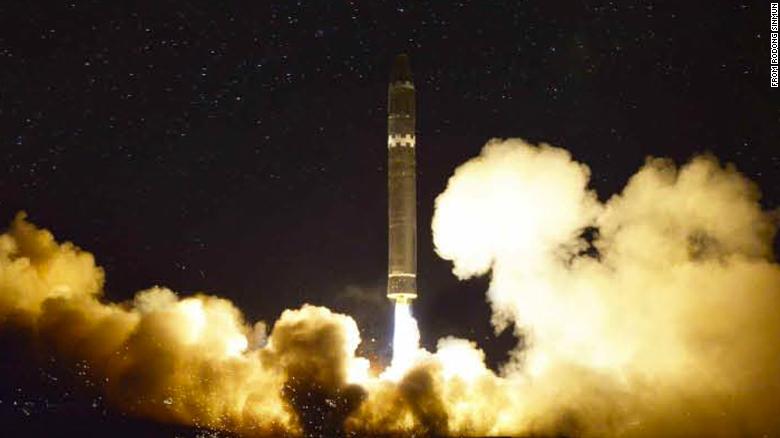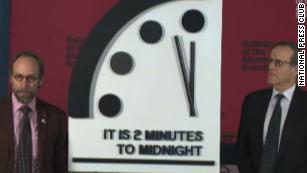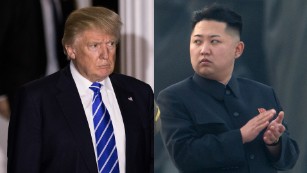
Give Trump more nuclear weapons and more ways to use them? Not a good idea
Tom Z. Collina is policy director of Ploughshares Fund, an organization that aims to reduce the risk of the use of nuclear weapons. The opinions expressed in this commentary are his.
On Friday, the Trump administration released its Nuclear Posture Review calling for new, more usable nuclear weapons and more ways to use them, including widening the rules on using them first. Donald Trump would get new nukes that his advisers claim are "low-yield," and that Trump might be more inclined to actually launch. And he would have new excuses to use them, including against large-scale cyberattacks, that previous presidents have rejected.
If you were hoping that Trump's bombastic words ("my nuclear button is bigger" and "fire and fury like the world has never seen") were all bluster and that he didn't have the policy or the firepower to back it up, think again. If you were looking for evidence that Trump and nukes are truly a dangerous combination, look no further.
Giving Trump new nukes AND new ways to use them is like giving matches and gasoline to Curious George. It will not end well. As 16 Democratic senators put it in a January 29 letter to Trump, the new policies "increase the risk of a nuclear arms race and raise the real possibility of nuclear conflict."
New nuclear missions
The Obama administration had sought to limit the role of nuclear weapons, so that the only use of the bomb would be to deter its use by others. As he left office, Vice President Joe Biden said, "President Obama and I are confident we can deter -- and defend ourselves and our allies against -- non-nuclear threats through other means." Moreover, Biden said that, "it's hard to envision a plausible scenario in which the first use of nuclear weapons by the United States would be necessary. Or make sense."
President Trump is now taking us in the opposite, dangerous direction. The Trump administration wants to expand the role of nukes to respond to "nonnuclear strategic attacks," including cyberattacks, and use them first in a crisis. As a result, we could have President Trump launching a first strike nuclear attack over a Russian or Chinese computer hack.
This is crazy. As bad as a major cyberattack could be, it would pale in comparison to a nuclear attack. Threatening nuclear attack against, say, Russia, in response to a cyberattack, would just invite a massive nuclear attack against the United States. Millions would die, the world economy would collapse and civilization as we know it could come to a screeching halt.
With the most powerful conventional and cyber military force in the world, the United States has no need to respond with nukes. But others might. Thus we should be working toward a global norm against nuclear use, not lowering the nuclear threshold. Moreover, cyberattacks are particularly hard to retaliate against, since it is difficult to definitively establish where the attack came from.
Even before the final NPR was released, the Pentagon was having trouble defending its policy. On January 31, Gen. Paul Selva, vice chairman of the Joint Chiefs of Staff, tried to explain that the United States would not respond to "any" cyberattack with nukes, but possibly to cyberattacks "with strategic consequences." This just raises new questions. Who decides what constitutes strategic consequences?
New nuclear weapons
The Trump administration wants to build two new types of nuclear weapons that it suggests are more likely to be used. Both types, a ballistic missile and a cruise missile, would be deployed at sea and would have a lower explosive yield than some others, but that does not make them any less dangerous. In fact, the administration says it wants these new weapons so it can make more credible nuclear threats.
On the defensive yet again, Selva said that having low-yield nuclear weapons does not "in and of itself lower the threshold for use of nuclear weapons."
Former Secretary of State George Shultz disagrees. "A nuclear weapon is a nuclear weapon," said Shultz, who served as President Ronald Reagan's top diplomat. "You use a small one, then you go to a bigger one. I think nuclear weapons are nuclear weapons and we need to draw the line there."
Shultz continued, "Your mind goes to the idea that, yes, nuclear weapons become usable. And then we're really in trouble, because a big nuclear exchange can wipe out the world." Or, as one retired senior Army officer told The American Conservative, low-yield nukes provide Trump with "a kind of gateway drug for nuclear war."
The public is right to distrust Trump with nuclear weapons, and we all need to speak up and oppose these new, dangerous policies. People don't tend to think of nuclear war as a policy choice, but it is, just like health care or immigration. The Trump administration's policies are increasing the risk of nuclear war.
Sure, you could build a bomb shelter and hide, but that does not lower the risk of war, and it is highly unlikely to save you. Instead, we need to prevent nuclear war in the first place by changing government policy.
Don't duck and cover. Speak up.


No comments:
Post a Comment